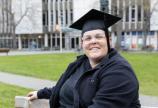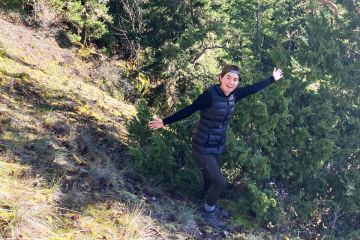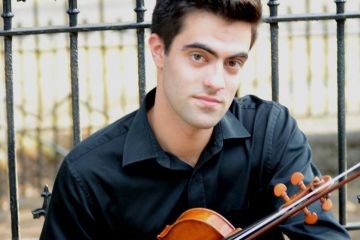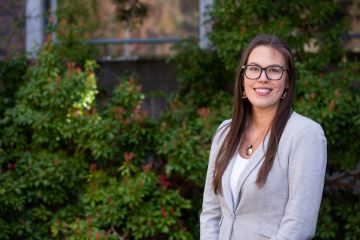Championing inclusivity in youth athletics
- Michelle Butterfield
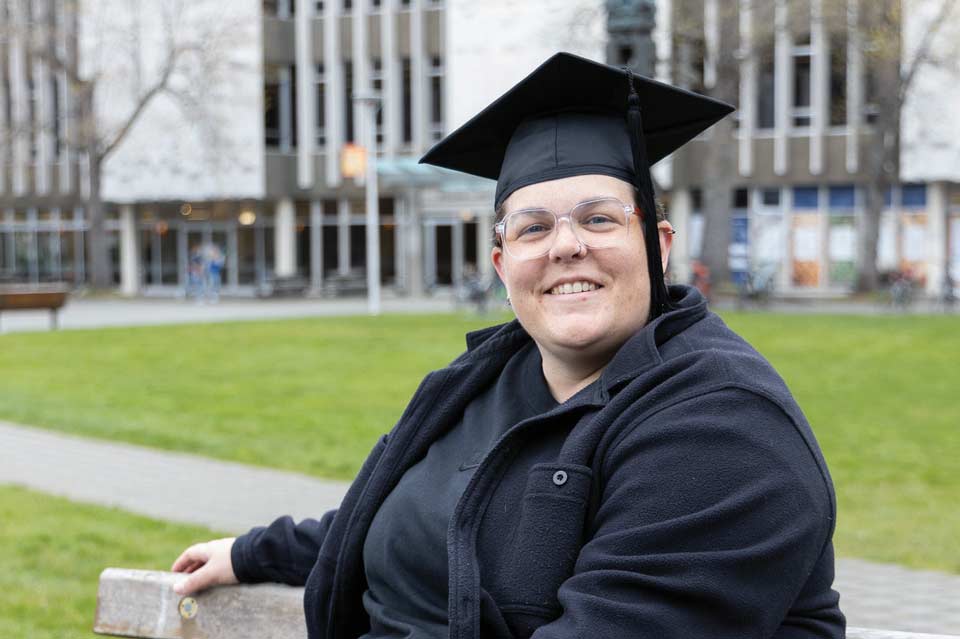
“I think it’s really important for kids to see a reflection of themselves in society.”
Angela Coutts completed her Bachelor of Education in Physical Education at UVic in 2012. Since then, she’s worked as a high school educator and coach in the Greater Victoria School District. She is currently the proud basketball coach and a physical education department head at Esquimalt High School. This June, she receives her second degree from UVic: a Master of Education in Coaching Studies.
Ange’s years of experience and drive to improve as a professional coach made her a perfect candidate for the graduate program. She cites her mentor Sandra Gibbons, a UVic professor in the School of Exercise Science, Physical and Health Education, who strongly encouraged Ange to continue her studies. As an educator, an additional certification like a master’s degree means that Ange can get paid more to teach. It also means that for the first time in her career, she can get paid to coach outside of the public school system.
“I grew up having amazing coaches, mentors and high school teachers. The coach/student relationship is so different than the teacher/student relationship. It allows you to build a deeper connection and a more nuanced understanding of each other.”
Ange chose to focus her graduate thesis project on 2SLGBTQI+ youth in athletics. As an “out” queer high school teacher and coach, she says the topic felt personal and relevant. She also says that many educators and coaches aren’t up to date on current terminology, pronoun use or other considerations for youth athletes. Some examples include having gender-neutral and accessible changerooms, or selecting teams in a way that doesn’t make assumptions about gender.
This level of awareness and understanding by coaches, instructors and administrators can make a huge difference in the experience of 2SLGBTQI+ youth athletes, many of whom say they feel the least safe in the gym. Statistics show that 64 per cent of 2SLGBTQI+ people feel unsafe at school in general.
For her research, Ange took a deep dive into a literature review, analyzing existing data about youth athletics programs in BC. She found that some information for educators is out there, but it is mostly self-directed and therefore doesn’t offer a chance for dialogue, questioning or working with others. Ange says these resources don’t serve educators in a way that creates meaningful change. Instead, she says that people need to hear personal stories of how individuals are affected when addressed by the wrong name or pronoun, or when they are put in the awkward position of having to publicly self-identify because of gendered changerooms or team selection. All of these examples can be avoided with some mindfulness on the part of coaches, educators and even administrators.
In response to this need, Ange developed a 90-minute professional development workshop that is meant to increase awareness around the needs of 2SLGBTQI+ youth athletes. It is based on real-life scenarios that coaches and educators will likely encounter, and was developed with community feedback from youth athletes across BC. Her hope is that this in-person workshop format will provide a more approachable entry point for educators and coaches to have these important, vulnerable and sometimes uncomfortable conversations.
People want to see women in sport move forward, but it’s still male dominated. For example, there were three girls in our program last year. So, to pick this topic while already being a minority was a bit nerve-wracking. Inclusivity in sports is a hot topic, and it’s not an easy conversation to have in front of a group of your peers. But people really do want to learn and improve. I always bring it back to the high school perspective, where our job is to keep kids active, healthy and safe.”
—UVic master's in education graduate Ange Coutts
Through her classes at UVic, Ange was able to learn from instructors who are actively working in their field. For example, she took a sports psychology course taught by the mental performance coach for Team Canada, and another course from Team Canada’s physiologist for world-class divers. Ange says these learning experiences reinforced her connection with the tight-knit Canadian athletics community, ultimately paving the way for her career as a professional coach.
“I often tell friends of mine that I’m not really coaching basketball. I’m coaching on how to be an independent woman or stand up for yourself, how to be a great global citizen, or what it means to be kind to people from different backgrounds than yourself. I happen to do that by teaching lay-ups. Sport is so much more than just running up and down a court. It’s a dynamic that a lot of kids might not have at home. So, I’m drawn to being able to lead people that way.”
Photos
In this story
Keywords: convocation, athletics, gender, youth, education, alumni
People: Ange Coutts
Publication: The Ring

